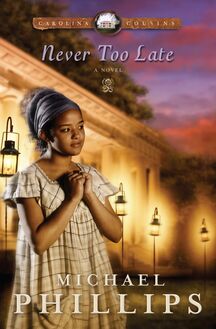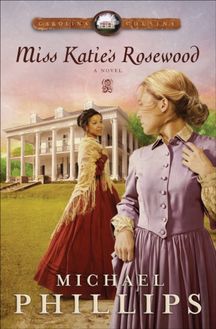Perilous Proposal (Carolina Cousins Book #1) , livre ebook
184
pages
English
Ebooks
2005
Vous pourrez modifier la taille du texte de cet ouvrage
Obtenez un accès à la bibliothèque pour le consulter en ligne En savoir plus
Découvre YouScribe et accède à tout notre catalogue !
Découvre YouScribe et accède à tout notre catalogue !
184
pages
English
Ebooks
2005
Vous pourrez modifier la taille du texte de cet ouvrage
Obtenez un accès à la bibliothèque pour le consulter en ligne En savoir plus
Publié par
Date de parution
01 juillet 2005
Nombre de lectures
0
EAN13
9781441211354
Langue
English
Poids de l'ouvrage
3 Mo
Publié par
Date de parution
01 juillet 2005
EAN13
9781441211354
Langue
English
Poids de l'ouvrage
3 Mo
© 2005 by Michael Phillips
Published by Bethany House Publishers 11400 Hampshire Avenue South Bloomington, Minnesota 55438 www.bethanyhouse.com
Bethany House Publishers is a division of Baker Publishing Group, Grand Rapids, Michigan. www.bakerpublishinggroup.com
Ebook edition created 2012
Ebook corrections 04.15.2016 (VBN), 11.15.2019
All rights reserved. No part of this publication may be reproduced, stored in a retrieval system, or transmitted in any form or by any means—electronic, mechanical, photocopying, recording, or otherwise—without the prior written permission of the publisher. The only exception is brief quotations in printed reviews.
Library of Congress Cataloging-in-Publication Data is on file at the Library of Congress, Washington, DC.
ISBN 978-1-4412-1135-4
Scripture quotations are from the King James Version of the Bible.
Cover design by John Hamilton/UDG DesignWorks Cover photography by Steve Gardner
To the friends of my youth from many years ago at Lincoln University in southeastern Pennsylvania.
From you I learned, to the limited extent such a thing is possible in this fallen world, to love and understand in some small measure a race other than my own. For the hearts of such men as Frank Brewington and Rufus Nance and many others of you who took me in as one of you, I will always be more grateful than words can say. Being part of your lives, for however briefly, enriched me, broadened me, and changed me in more ways than I am sure I even realize myself.
I have not forgotten you . . . and never will.
C ONTENTS
Cover
Title Page
Copyright Page
Dedication
Prologue
1. Night Riders in White
2. Slave Boy
3. Boy, Papa, and Master
4. Separations
5. Words of Anger
6. Jake’s Mama
7. Farewell
8. Terrifying Encounter
9. Micah Duff
10. New Surroundings
11. Scuffle
12. Left Behind
13. Recovery and Reflection
14. The Order of Things
15. Twisted Grain
16. Freedom Cousins
17. The Freedom War
18. Light
19. Hard Words
20. Away
21. Haunted by a Mother’s Words
22. Unsought Tragedy
23. Unlikely Alliance
24. Respite
25. Carolina
26. Fateful Discovery
27. Accusation and Agony
28. Meeting
29. Remembering
30. Changes
31. Surprise Caller
32. To the Rescue
33. New Boy in Town
34. Cotton
35. A Stranger Who Wasn’t a Stranger
36. Kinfolk
37. Cotton-Pickin’ Henry
38. Rain
39. Moonlight Stroll
40. No Ain’t No Answer
41. A Welcome Surprise
42. Shoot-out
43. Aftermath of Death
44. So Many Uncles!
45. Final Notice
46. Together Again
47. A Daddy for William
48. Mr. Thurston’s Box
49. A Thoughtful Day
50. A Day to Remember
51. Voices in the Night
52. Night Raid
53. Out of the Depths
54. Father and Son
55. A Woman’s Honor
56. Abduction
57. Lynching
58. Decision of Love
59. Endings and Beginnings
Epilogue
Author Biography
Notes
Other Books by Michael Phillips
Ad
Back Cover
P ROLOGUE
Maybe we shouldn’t have been surprised by what happened. But we were. We had been living in danger for so long, I reckon we forgot how dangerous it really was—especially for blacks like us. Considering all that had happened before, and how folks ’round there felt about a black boy touching a white girl—even if it was only to protect her—we should have known what was coming. We probably should have hidden him away, or sent him north or . . . something. But we didn’t.
It is still so painful to recall that it brings tears to my eyes—having the man I loved ripped away from me. How I wished, in that awful fire-flickering moment when I could still see his face, that I hadn’t put him off, that I had agreed to his proposal when I’d had the chance . . . in spite of the danger. But it was too late now.
I could not help wondering if I would ever see his face again, or if I would even live through the night myself.
N IGHT R IDERS IN W HITE
1
T HE SKY WAS SO BLACK NO ONE COULD HAVE SEEN their own hand in front of their face. Everyone in the big house was asleep, and had been for hours. There wasn’t a moon.
Only silence.
But the stillness would soon be broken. For murder approached through the night.
The distant thunder of horses’ hooves gradually intruded into the senses of the dogs where they lay. Even asleep, their ears turned instinctively toward the sound. Instantly they jumped to their feet. A few barks echoed into the night. They weren’t enough to wake anyone inside . . . not yet.
But the riders were coming fast. Within a minute or two the dogs were howling at whatever was moving toward them. Uneven flames played against the black horizon . . . and the pounding of hooves grew ominous. The dogs saw the strange lights and barked the louder. Five or six sleepers stirred in their beds.
Two minutes later a posse of riders galloped recklessly into the yard. Dust rose in all directions. The dogs flew about in a yowling frenzy at the horses’ feet. Chickens in their sheds cackled in an uproar of confusion, and a few cows in the barn began to low restlessly. Lanterns appeared in a couple of the windows. They were hardly needed. The torches of flame held from every rider’s hand jumped high in the blackness and cast eerie shadows on the walls of house and barn and lit up the open space between.
“Hey you inside!” called the deep voice of the lead horseman. “You got a nigger in there—we’re here for him!”
The band of white-hooded riders around him sat waiting. Their prancing mounts fidgeted with jittery energy after the long ride.
Daring a few glances outside, the women in the house trembled with terror.
After a long minute, at last the door of the house opened. A white man holding a lantern stepped onto the porch. He did not carry a gun. He hoped somehow to deal with this peaceably. Though he was not a man easily cowed, the sight that met his eye was enough to send a chill up his spine. He had spent most of his life talking rather than shooting his way out of trouble. Whether he would be able to do so on this present occasion looked doubtful. In front of him sat twelve riders draped in white sheets and with masked faces.
“We’re here for the nigger . . . you know why!” said the rider.
“You know who we’ve got here,” replied the white man. “They’re none of your concern.”
“That young buck made himself our concern yesterday. This is what comes of being too friendly with that little girl of yours. Now he’s going to pay! Hand him over or these torches’ll be through your windows and that house of yours’ll be nothing but cinders come morning.”
“He doesn’t live here. We’ve just got a couple of house darkies.”
“Word has it he’s been out—”
“Hey, Dwight—” interrupted another voice.
“Shut up, you fool,” spat the spokesman, turning in his saddle. “—I told you . . . no names.”
“But I got him . . . he was hiding in the barn!”
All eyes turned toward the voice. A tall young man wearing one of the white capes was dragging a young black man, still rubbing sleep out of his eyes, through the barn door into the torchlit night.
“That’s him!” cried another of the riders.
Half the saddles emptied. Within seconds a small crowd was viciously kicking and beating the black man into the dirt. A few moans were his only reply.
“That’s enough—plenty of time for all that later,” yelled the man called Dwight. “We don’t want to kill him here. Just get the rope around him and put him up on that horse.”
“All right, you boys have had your fun,” said the white man, walking toward them from the house. He still hoped to end the incident without bloodshed. “He’s done nothing to any of you.”
“He forgot what color his skin is—that’s enough!” yelled another of the riders. “You seem to have forgotten it too.”
“Ain’t no good can come to a nigger-lover around here, mister,” chided another. “That’s something you maybe oughta remember. You and your kind ain’t welcome in these parts.”
Behind them, the door of the house opened again. Out stepped a white woman, by appearance close to twenty. Terrified at the sight that met her gaze, she drew in a steadying breath. Then she stepped off the porch and came forward with more apparent courage than she felt inside. She knew, in one way, that she was herself the cause of this incident. She hoped she could keep it from becoming still more dangerous.
“He meant nothing by what he did,” she said, walking forward and speaking to the lead rider. “It was my fault, not his. I shouldn’t have interfered.”
“Then he should have known better, miss—and you should have yourself. Now that it’s done, he’s got to pay.”
Out of the corner of her eye she saw the black man being shoved onto the back of one of the horses with his hands tied behind his back. One of the other men began forcing a noose around his neck.
“Get it tight!” yelled another with an evil laugh.
“But you can’t do this!” she cried in a pleading voice. She ran toward them. “He’s done nothing wrong!”
Rude hands restrained her and yanked her back. A surge of fury filled the white man where he stood a few yards away. He took several steps forward. But there was nothing he could do against so many. The young woman ran to his side in desperation.
“Let’s go, Dwight,” yelled one of the men, “—we got him!”
The last of the riders remounted. The rest began to swing their horses around.
Out of the house now flew another woman, this one black. She ran straight for the captive. Before the riders could stop her she threw herself against the horse where he was bound and clung to one of his legs. He looked down and tried to reassure her with a smile. The light from the surrounding torches danced in her eyes, wet with tears of terror that she would never see him again.
The eyes of the two former slaves met but for a moment. Though the noose had already begun to choke his neck, the young man tried to speak.
“I love . . . we’ll—” he began.
A rude slap across the mouth from the nearest of the horsemen silenced him. At the same instant, a booted foot fro



